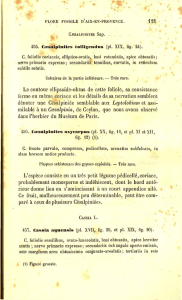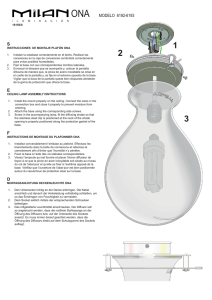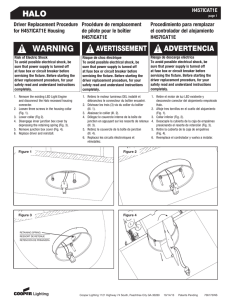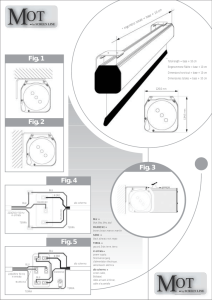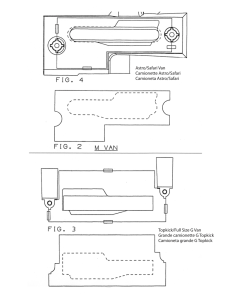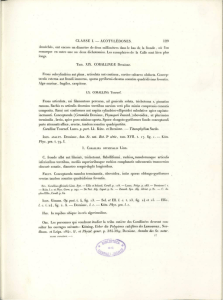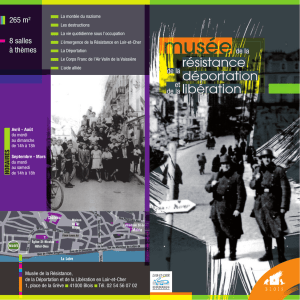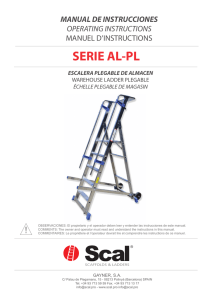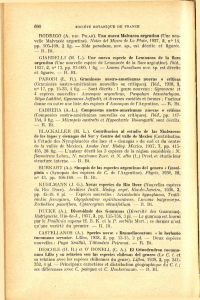chefs-rules-PS-8pont-tuti:Layout 1
Anuncio
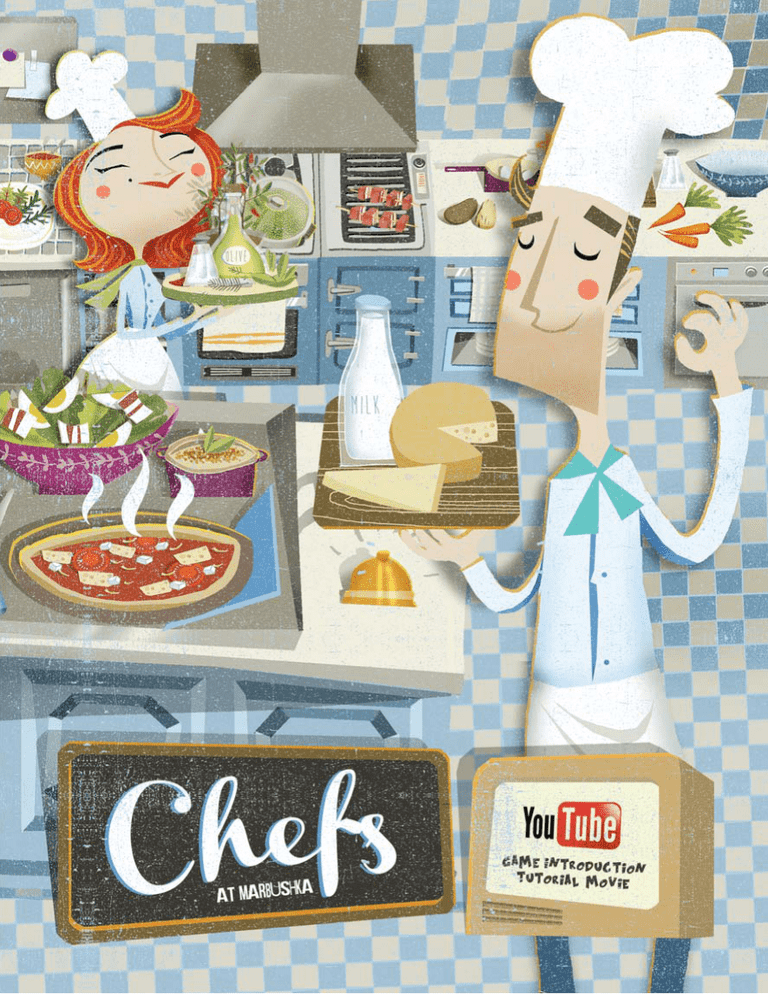
chefs-rules-PS-8pont-tuti:Layout 1 5/11/15 9:58 AM Page 2 Chefs game of tactics for 2-6 players from age 7 EN Do you know how many zucchinis you need for a chocolate cake? It's no problem if you don't know, you'll find out during the game! You can make wonderful meals for high points. You can try what you would be like as a chef in a busy kitchen where you have to compete with the other chefs for the best kitchen counters and to get the ingredients. The story takes place in multiple locations, and in the end you will see that making the meals is really a serious strategic task! Preparing the game (fig. 1): Choose which chef you want to be, and put in front of yourself: – the chef – the card with the chef drawn on it – and the three action marker discs belonging to it. Put the chefs that are not playing and the items belonging to them (discs, chef cards) back in the box. Shuffle the deck of ingredients cards and meal cards (separately), and place them next to the board, these will be the drawing decks. You are going to deal from these decks at the beginning of the first round, and later you will place new cards at the locations at the beginning of each round from these decks. Next to the drawing decks, leave some space for the discarded cards, too. If the drawing deck runs out, shuffle the corresponding discarded deck, and put it back in the game. There are five locations on the board (fig. 2): 1. counter of ingredients – you can pick up ingredients needed for the meals here 2. cooker at the window – where you can prepare the food 3. door – where you can exchange things with the supplier 4. cooker at the wall – where you can prepare the food 5. service counter – where you have to place the finished meals At the beginning of the game, place cards next to the board (fig. 2): for 2 chefs: 4 „ingredients” cards to the counter of ingredients, 1 „meal” card each to the cookers for 3-4 chefs: 6 „ingredients” cards to the counter of ingredients, 2 „meal” cards each to the cookers for 5-6 chefs: 8 „ingredients” cards to the counter of ingredients, 3 „meal” cards each to the cookers If you’re done with this, deal 2 cards for everyone from the ingredients cards, and place your chefs by the open door. Choose the starting player, who should take the starting player card. Now the game can begin! The goal of the game is to acquire as many meal cards with as many points as possible, and exchange them for steps. The person who passes field 20 and gets the farthest in the last round, wins the game. Playing the game: The game consists of rounds, and one round has three phases: 1. Placing the action markers 2. Executing the action (acquiring ingredients, cooking, placing on the service counter) 3. Preparing for the next round 1. Placing the action markers Before you put down your action markers, think over the following: What kind of ingredients do you have in your hand? Then look at the meal cards placed by the cookers! What ingredients do you need to make them? How many points are they worth? Is it worth risking for them? After this, put your action marker on the location where you want to execute an action (fig. 3). The action markers placed on the board determine where and in what order the chefs will execute the actions. The starting player places an action marker on the location of their choosing, then, going around clockwise, the other chefs put down 1 action marker each. Repeat this process until all players have put down all three of their action markers. You can never put down more than one action marker when it’s your turn! There can be one action marker in each circle, but one chef can have more than one marker at the same location. When you’re done with this, the first phase is over, now you can execute the actions! chefs-rules-PS-8pont-tuti:Layout 1 5/11/15 9:58 AM Page 3 2. Executing the action The player who placed their action marker on the first circle of the first location begins. After executing the action, they should take the action marker from the location and place it in front of themselves, because they will need it again in the next round. Then the chef in the second circle executes their action and takes their disc… and so on. Important: Only one action can be executed for each disc. You have to go along the locations in the following order (fig. 2), and you can execute the following actions: • 1st location: Counter of ingredients An action makes it possible to take two ingredients of your choosing from the „ingredients” cards found here (fig. 4). If there are none left by the time it’s your turn, then you’re out of luck. Suggestion: If there are only things left that you didn’t need, pick it up anyway and next time, place your action marker at the door where you can exchange it. • 2nd location: Cooker by the window An action makes it possible to pick up (make) a meal card, of course only if you can put in (place on the deck of discarded cards) the right ingredients in the needed amount (fig. 6). Take a good look at your chef card! There is an ingredient in his hand, too, so you can use this card instead of an ingredients card to get the meal card (fig. 7). You can keep your chef card even after this, and during the round you can still use it at the other cooker. It is only valid once at one location, and you can not use it more than once for the same meal card. There is a number on every meal card – that’s how many steps you can take if you exchange it at the service counter. Until then, place it by yourself. • 3rd location: Door Here you can exchange your ingredients card/cards that you don’t need.You can choose an exchange option in the order the action markers were placed. There are five separate chests with different options (fig. 5): You can exchange 1 card for 1 card, 1 for 2, 2 for 2, 2 for 3, 3 for 4. The player who placed their action marker on the first field in this location may choose first how many cards they will exchange, and place their action marker on the corresponding chest. This means that other players can not choose this option. You can exchange the ingredients cards by throwing as many ingredients cards on the discarded deck as is shown by the first number on the exchange chest, and you get as many cards from the drawing deck as is shown by the second number. • 4th location: Cooker by the wall Here you have the same options as in location Cooker by the window (fig- 6-7.). You can use your chef card here, too, regardless of whether you have used it at the other cooker. • 5th location: Service counter Action here makes it possible to exchange the number on your meal card for points that you can use as steps. When it is your turn in this location, place ONE of your meal cards on the tray and take as many steps with your chef as the card shows (fig. 8). If you have placed multiple action markers in the location, and it is your turn multiple times, of course you can put another meal card on the service counter and step forward. 3. Preparing for the next round: After you are done with all five locations, get ready for the next round: Fill up the counter of ingredients and the cookers from the drawing decks with as many cards as is defined by the number of chefs in the game. In this round, the starting chef (player) will be the one to the left of the previous starting chef (player), they should take the starting player card. The end of the game: The game ends in the round when a chef passes field 20 and inevitably goes on from the beginning (field one is 21, field two is 22… and so on). The player whose chef reaches the farthest by the end of the round wins. Contents of the game: 1 game board, 6 chef figures, 6 chef cards, 1 starting player card, 3×6 action marker discs, 6×10 ingredients cards, 29 meal cards chefs-rules-PS-8pont-tuti:Layout 1 5/11/15 9:58 AM Page 4 Chefs Taktikspiel für 2-6 Spieler ab 7 Jahren DE Weißt du, wie viel Zucchini man für einen Schokoladenkuchen braucht? Mach dir keinen Kopf, falls es dir gleich nicht einfällt, im Laufe des Spiels kommt es sowieso ans Licht. Du kannst immer bessere Speisen für immer bessere Punkte zubereiten. Du kannst ausprobieren, was für ein Chef du in einer gut besuchten Küche wärst, in der du mit den anderen Chefs um die besten Küchentheken und Zutaten konkurrieren musst. An mehreren Orten finden die Ereignisse statt und am Ende wirst du sehen, dass die Zubereitung der Speisen tatsächlich eine seriöse taktische Aufgabe ist. Spielvorbereitungen (fig. 1): Wählt aus, mit welchem Chef ihr spielen möchtet und nimmt zu euch: – den Chef – die Karte mit eurem Chef (Chefkarte) – und die dazugehörigen 3 Aktionsscheiben Die Chefs und ihre Zubehöre (Scheiben, Chefkarten), mit denen im Laufe des Spiels nicht gespielt wird, kommen in die Schachtel zurück. Mischt den Kartenstapel der Zutaten und der Speisen (getrennt) gut und legt sie neben das Spielbrett, diese sind eure Ziehstapel. Von diesen werdet ihr am Anfang der ersten Runde teilen und im Späteren am jeden Rundenanfang die neuen Karten an die abgebildeten Orte der Küche legen. Lasst Platz neben dem Ziehstapel für die weggeworfenen Karten. Falls der Ziehstapel zu Ende ist, mischt den Abwurfstapel gut und spielt damit weiter. Fünf Orte befinden sich auf dem Brett (fig. 2): 1. Zutatentheke – hier kannst du die zu den Speisen nötigen Zutaten besorgen 2. Ofen am Fenster – wo du die Speise zubereiten kannst 3. Tür – wo du beim Kaufmann/Zulieferer Sachen eintauschen kannst 4. Ofen an der Wand – wo du die Speise zubereiten kannst 5. Serviertheke – auf die die gefertigten Speisen gelegt werden sollen Legt Karten am Spielanfang neben das Brett (fig. 2): bei 2 Chefs: 4 Zutatenkarten zur Zutatentheke, je 1 Speisekarte zu den Öfen bei 3-4 Chefs: 6 Zutatenkarten zur Zutatentheke, je 2 Speisekarten zu den Öfen bei 5-6 Chefs: 8 Zutatenkarten zur Zutatentheke, je 3 Speisekarten zu den Öfen Wenn ihr fertig seid, teilt jedem Spieler je 2 Zutatenkarten aus und legt eure Chefs vor die offene Tür. Wählt einen Spieler, der beginnt und die Spielstartkarte zu sich nimmt. Jetzt kann das Spiel beginnen. Ziel des Spiels: immer mehr Speisekarten mit immer größeren Punkten zu erwerben und diese gegen Schritte einzutauschen. Wer das zwanzigste Feld überschreitet und in der letzten Runde am weitesten kommt, gewinnt das Spiel. Spielablauf: Das Spiel besteht aus Runden und eine Runde aus 3 Phasen: 1. Ablage der Aktionsscheiben 2. Durchführung der Aktion (Zutatenbesorgung, Kochen, Servieren) 3. Vorbereitung auf die nächste Runde 1. Ablage der Aktionsscheiben Bevor ihr eure Aktionsscheiben auf das Spielbrett legt, überlegt euch folgendes gut: Welche Zutaten habt ihr auf der Hand? Checkt die Speisekarten neben den Öfen! Mit welchen Zutaten können die Speisen zubereitet werden? Für wie viele Punkte? Sind sie das Risiko wert? Lege dann deine Aktionsscheibe an den Ort der Küche, wo du die Aktion durchführen möchtest (fig. 3). Die auf das Brett gelegten Aktionsscheiben bestimmen, wo und in welcher Reihenfolge die Chefs die Aktionen durchführen sollen. Der jüngste Chef legt eine Aktionsscheibe an einen Ort seiner Wahl, dann die nächsten Chefs im Uhrzeigersinn legen je eine Aktionsscheibe ab. Ihr sollt diesen Prozess wiederholen, bis jeder Spieler seine 3 Aktionsscheiben niederlegt. Auf einmal kannst du nur eine Aktionsscheibe ablegen. In jedem Ringelchen darf nur eine Aktionsscheibe sein, aber ein Chef darf mehrere Aktionsscheiben an demselben chefs-rules-PS-8pont-tuti:Layout 1 5/11/15 9:58 AM Page 5 Ort haben. Wenn ihr fertig seid, endet die erste Phase. Jetzt dürft ihr die Aktionen durchführen. 2. Durchführung der Aktion Derjenige Spieler beginnt, der seine Aktionsscheibe auf das erste Ringelchen des ersten Ortes gelegt hat. Nach der Durchführung der Aktion soll er seine Scheibe vom Brett zurücknehmen und vor sich ablegen, denn er wird sie auch in der nächsten Runde brauchen. Danach ist der Chef auf dem zweiten Ringelchen mit seiner Aktion am Zug und nimmt seine Scheibe zu sich… und so weiter. Achtung: Für jede Scheibe ist nur eine Aktion durchzuführen. Die Orte sollen in der nachstehenden Reihenfolge besucht werden und die im Folgenden stehenden Aktionen könnt ihr durchführen (fig. 2): 1. Ort: Zutatentheke Eine Aktion hier ermöglicht dir, aus den Zutatenkarten beliebig zwei zu ziehen (fig. 4). Wenn alle Karten aufgebraucht sind und du dran bist, hattest du leider kein Glück. Vorschlag: falls nur Karten übrig geblieben sind, welche du nicht brauchst, nimm sie schön brav auf und lege deine Aktionsscheibe nächstes Mal vor die Tür, wo du diese dann eintauschen können wirst. 2. Ort: Ofen am Fenster Eine Aktion hier ermöglicht dir die Aufnahme einer Speisekarte (Zubereitung einer Speise), aber natürlich nur im Falle, wenn du die passenden Zutaten in der notwendigen Menge hinzugeben (also auf den Abwurfstapel legen) kannst (fig. 6). Schau dir deine Chefkarte gut an! In seiner Hand ist auch eine Zutat zu finden, deshalb kannst du diese Karte auch als Zutatenkarte verwenden, um dir die Speisekarte zu holen (fig. 7). Deine Chefkarte kannst du auch weiterhin behalten und im Laufe der Runde bei dem anderen Ofen verwenden. An einem Ort ist diese nur einmal gültig und du darfst sie mehrmals für dieselbe Speisekarte nicht ausspielen. Auf jeder Speisekarte ist eine Nummer zu sehen – so viel kannst du dich fortbewegen, wenn du die Karte bei der Serviertheke einlöst. Halte sie bis dahin neben dir. 3. Ort: Tür Hier kannst du deine Zutatenkarte(n) eintauschen, welche du nicht mehr brauchst. Ihr könnt mit euren Eintauschmöglichkeiten entsprechend der Ablage-Reihenfolge eurer Aktionsscheiben leben. Es gibt fünf verschiedene Kisten mit verschiedenen Möglichkeiten (fig. 5). Du kannst eine Karte gegen eine, eine gegen zwei, zwei gegen zwei, zwei gegen drei, drei gegen vier eintauschen. Wer seine Aktionsscheibe hier auf das erste Feld abgelegt hat, kann entscheiden, wie viele Karten er eintauschen will, und legt dann seine Aktionsscheibe auf die entsprechende Kiste. Dies bedeutet: diese Möglichkeit kann keiner mehr wählen. In diesem Fall soll die Aktionsscheibe so lange auf der Kiste gelassen werden, bis jeder Spieler an diesem Ort fertig ist. Indem du so viele Zutatenkarten wegwirfst, wie die erste Nummer der Eintauschkiste zeigt, kannst du deine Zutatenkarten eintauschen, für die du so viele Karten vom Ziehstapel bekommst, wie die zweite Nummer der Kiste angibt. 4. Ort: Ofen an der Wand Hier hast du dieselben Möglichkeiten, wie am Ort „Ofen am Fenster“ (fig. 6-7). Deine Chefkarte kannst du auch hier benutzen, unabhängig davon, ob du diese bereits beim anderen Ofen verwendet hast. 5. Ort: Serviertheke Die Aktion hier gibt dir die Möglichkeit, die Nummer auf der Speisekarte abzuschreiten. Wenn du an diesem Ort an der Reihe bist, lege EINE deiner Speisekarten auf das Tablett und schreite mit deinem Chef so viel vorwärts, wie die Karte anzeigt (fig. 8). Hast du am Ort mehrere Aktionsscheiben abgelegt, weswegen du mehrmals am Zug bist, kannst du natürlich noch weitere Speisekarten auf die Serviertheke legen und dich fortbewegen. 3. Vorbereitung auf die nächste Runde Habt ihr bereits alle fünf Orte besucht, sollt ihr euch auf die nächste Runde vorbereiten: Füllt die Theke der Zutaten und die Öfen mit so vielen Karten vom Ziehstapel auf, wie die Anzahl der am Spiel teilnehmenden Chefs verlangt. In dieser Runde wird zum Spielanfänger, der sich links neben dem vorherigen Spielanfänger befindet. Der soll die Spielstartkarte auf die Hand nehmen. Ende des Spiels: Das Spiel endet in der Runde, in der ein Chef das zwanzigste Feld überschreitet und je nach Bedürfnis von vorne weiterspielt (das erste Feld ist das 21., das zweite Feld ist das 22… und so weiter.) Wessen Chef am Ende der Runde am weitesten kommt, gewinnt das Spiel. Spielinhalt: 1 Spielbrett, 6 Chefs, 6 Chefkarten, 1 Spielstartkarte, 3x6 Aktionsscheiben, 6x10 Zutatenkarten, 29 Speisekarten chefs-rules-PS-8pont-tuti:Layout 1 5/11/15 9:58 AM Page 6 Chefs Jeu de tactiques pour 2 à 6 joueurs à partir de 7 ans FR Quel chef serez-vous dans cette cuisine de restaurant, face à d’autres chefs cuisiniers qui veulent comme vous les meilleurs ingrédients et les meilleures préparations ? L’histoire se passe à plusieurs endroits dans la cuisine, et vous verrez que préparer les plats est un travail très sérieux, qui demande de la stratégie ! Préparation du jeu (fig.1) : Choisissez le chef que vous voulez être, et mettez devant vous : -le chef cuisinier -la carte avec le chef dessiné -les trois pastilles d'action qui lui correspondent. Remettez les chefs qui ne jouent pas et les éléments leur appartenant (pastilles, cartes de chef) dans la boîte. Mélangez séparément les cartes Ingrédient et les carte Plat, et placez-les à côté du plateau, ce seront les pioches. Vous allez utiliser ces cartes au début du premier tour de jeu, et vous ajouterez de nouvelles cartes au début de chaque tour. À côté de ces pioches, laissez un peu d'espace pour les cartes défaussées. Si la pioche est épuisée, mélangez les cartes défaussées et remettez-les en jeu. Il y a cinq emplacements sur le plateau de jeu (fig.2) : 1. Comptoir des ingrédients - où vous pouvez vous procurer les ingrédients nécessaires à la préparation des plats 2. Cuisinière côté fenêtre - où vous pouvez préparer les plats 3. Porte - où vous pouvez échanger des ingrédients avec le fournisseur 4. Cuisinière côté mur - où vous pouvez préparer les plats 5. Comptoir de service - où vous mettrez les plats, prêts à être servis. Au début du jeu, mettez les cartes suivantes sur le plateau (fig.2) : Pour un jeu avec deux chefs : 4 cartes Ingrédient au comptoir des ingrédients, et une carte Plat à chacune des cuisinières Pour un jeu à trois ou quatre chefs : 6 cartes Ingrédient au comptoir des ingrédients, deux cartes Plat pour chacune des cuisinières Pour un jeu à cinq ou six chefs : 8 cartes Ingrédient au comptoir des ingrédients, et trois cartes Plat pour chacune des cuisinières. Quand vous avez terminé, distribuez deux cartes Ingrédient à chaque joueur, et placez vos chefs devant la porte de la cuisine (devant la case 1). Choisissez le premier joueur, qui prendra la carte de départ. Maintenant, le jeu peut commencer ! Le but du jeu est de préparer le plus de plats possibles, chaque plat servi donnant des points, qui permettent d’avancer sur les cases. Le gagnant est le joueur qui dépasse la case 20 et va le plus loin dans le dernier tour. Déroulement du jeu : Le jeu se compose de tours, et chaque tour comporte trois phases : 1. Mise en place des pastilles d'action 2. Exécution de l'action (acquisition des ingrédients, cuisson, mise sur le comptoir de service) 3. Préparation du tour suivant 1. Mise en place des pastilles d'action Avant de déposer vos pastilles d'action, réfléchissez à ce qui suit : Quel types d'ingrédients avez-vous dans votre jeu ? Regardez les cartes Plat placées sur les cuisinières : de quels ingrédients avez-vous besoin pour les réaliser ? De combien de points vous permettront-elles d’avancer ? Est-ce que cela en vaut la peine ? Après cela, mettez votre pastille d'action sur l'emplacement où vous voulez exécuter une action (fig.3). Les pastilles d'action mises sur le plateau de jeu vont déterminer le lieu et l’ordre dans lequel les chefs vont exécuter les actions. Le premier joueur place une pastille d'action sur l’emplacement de son choix, puis, chefs-rules-PS-8pont-tuti:Layout 1 5/11/15 9:58 AM Page 7 dans le sens des aiguilles d’une montre, chacun des joueurs va à son tour placer une pastille. Répétez ce processus jusqu'à ce que tous les joueurs aient posé leurs trois pastilles d'action. Vous ne pouvez jamais déposer plus d’une pastille d'action quand c’est votre tour. Il ne peut y avoir qu’une pastille d'action dans chaque cercle, mais un chef peut avoir plus d'une pastille par emplacement. Lorsque vous avez terminé, la première phase est finie, vous pouvez alors exécuter les actions. 2. Exécution de l'action Le joueur qui a placé sa pastille d'action sur le premier cercle du premier emplacement commence. Après l'exécution de l'action, il doit reprendre sa pastille et la placer devant lui, car les pastilles serviront à nouveau au tour suivant. Puis le chef placé dans le deuxième cercle exécute l’action et reprend sa pastille ... et ainsi de suite. Important : une seule action doit être exécutée pour chaque pastille. Vous devez aller tout au long des emplacements dans l'ordre, en exécutant les actions là où vous avez placé une pastille action (fig.2) : 1er emplacement : Comptoir des ingrédients Permet de prendre deux cartes Ingrédient de votre choix parmi les cartes Ingrédient trouvées à ce comptoir (fig.4). S’il n'y en a plus quand vient votre tour, pas de chance ! Suggestion : s’il reste des cartes Ingrédient dont vous n’avez pas besoin, ramassez-les quand même, et au tour suivant, placez votre pastille d'action à la porte des fournisseurs, où vous pouvez les échanger. 2ème emplacement : Cuisinière côté fenêtre Permet de prendre une carte Plat, à condition bien sûr d’avoir les bons ingrédients qui figurent sur la carte Plat, et dans la quantité indiquée (fig.6). Regardez la carte de votre chef, il a un ingrédient dans sa main : vous pouvez utiliser cette carte à la place d'une carte Ingrédient, pour prendre la carte Plat (fig.7). Vous gardez votre carte chef, et pendant le tour, vous pouvez encore l'utiliser pour l’autre cuisinière. La carte chef n’est valable qu'une seule fois à un endroit, et vous ne pouvez pas l’utiliser plus d'une fois pour un même Plat. Il y a un chiffre sur chaque carte Plat : ce chiffre indique de combien de cases vous pourrez avancer, quand vous aurez déposé votre Plat sur le comptoir de service. Gardez votre carte Plat, jusqu’à ce que vous arriviez à ce comptoir. 3ème emplacement : Porte des fournisseurs Ici vous pouvez échanger les cartes Ingrédient dont vous n’avez pas besoin. Vous choisissez une option d’échange, selon l'ordre dans lequel les pastilles d’action ont été placées. Il y a cinq cageots numérotés (fig.5): Vous pouvez échanger soit 1 carte contre 1 carte, 1 contre 2, 2 contre 2, 2 contre 3, et 3 contre 4. Le joueur qui a placé sa pastille d'action sur le premier cercle peut choisir en premier combien de cartes il échange, et place sa pastille d'action sur le cageot correspondant. Cela signifie que les autres joueurs ne peuvent plus choisir ce cageot. Chacun à la suite choisit le nombre de carte Ingrédient qu’il pourra échanger . 4ème emplacement : Cuisinière côté mur Mêmes possibilités que pour l’autre cuisinière (fig.6-7). Vous pouvez réutiliser votre carte de chef. 5ème emplacement : Comptoir de Service Permet d’avancer d’autant de cases, que de points indiqués sur la carte Plat que vous déposez (fig.8). Si vous avez placé plusieurs pastilles d'action à cet emplacement, et que c’est à nouveau votre tour vous pouvez mettre une autre carte Plat sur le comptoir de service, et avancer d’autant de cases. 3. Préparation pour le tour suivant : Après avoir fait le tour des cinq emplacements, préparez-vous pour le tour suivant : Prenez des cartes Ingrédient et Plat dans la pioche, comme indiqué selon le nombre de joueurs, et remettez-les sur les emplacements correspondants. Le joueur qui avait la carte de départ la donne à son voisin de gauche, qui commencera le tour. La fin du jeu : Quand un chef passe la case 20 ou la dépasse (case 20+1 = 21, 20+2= 22 ... et ainsi de suite), le joueur dont le chef atteint la case la plus éloignée à la fin de ce tour, a gagné. Contenu du jeu : 1 plateau de jeu, 6 pions chef, 6 cartes chef, une carte de départ, 3 × 6 pastilles d'action, 6 × 10 cartes Ingrédient, 29 cartes Plat. chefs-rules-PS-8pont-tuti:Layout 1 5/11/15 9:58 AM Page 8 Cocineros 2-6 jugadores a partir de 7 años. ES ¿Sabes cuántos zucchinis necesitas para preparar un pastel de chocolate? No te preocupes si no lo sabes: ¡lo descubrirás durante el juego! Debes elaborar riquísimas comidas para conseguir alta puntuación. Puedes experimentar lo que supone trabajar de chef en una ajetreada cocina, en la que compites con los demás chefs para conseguir los ingredientes y los mejores mostradores de la cocina. La historia transcurre en diferentes ubicaciones de la cocina. Te darás cuenta que preparar un delicioso plato es realmente una tarea estratégica. Preparación del juego (Fig. 1): Elige cuál de los chefs quieres ser. Sitúa delante tuyo: – el cocinero – la carta con la ilustración del chef – y los tres discos de marcador de acción que le pertenecen. Pon los chefs que no juegan y los elementos que les pertenecen (discos, cartas de cocinero) de vuelta en la caja. Baraja el mazo de cartas de comida y el de ingredientes de comida, y coloca ambos al lado del tablero. Les llamaremos mazos de dibujo. Al principio de cada ronda tomarás cartas de cada mazo para colocarlas en el tablero, según se indique. Junto a cada mazo deja espacio libre para colocar las cartas descartadas. Si el mazo de dibujo se agota, baraja las cartas descartadas correspondientes, y ponlas de nuevo en el juego. Hay cinco posiciones en el tablero (fig. 2): 1. Mostrador de ingredientes – donde puedes recoger los ingredientes necesarios para elaborar las comidas. 2. Fogones junto a la ventana - donde puedes preparar la comida. 3. Puerta - donde puedes intercambiar ingredientes con el proveedor. 4. Fogones de pared - donde puedes preparar la comida. 5. Mostrador de Servicio - donde tienes que colocar los platos terminados. Al principio del juego, coloca las cartas junto al tablero (fig. 2): Si juegan 2 chefs: 4 cartas ingredientes en el mostrador de ingredientes, 1 carta comida en cada uno de los fogones. Si juegan 3-4 chefs: 6 cartas ingredientes en el mostrador de ingredientes, 2 cartas comida en cada uno de los fogones. Si juegan 5-6 chefs: 8 cartas ingredientes en el mostrador de ingredientes, 3 cartas comida en cada uno de los fogones. A continuación, reparte 2 cartas del mazo de ingredientes a cada jugador, y coloca los chefs en la puerta abierta. Elige quién empezará el juego y entrégale la carta de primer jugador. ¡El juego ya puede comenzar! El objetivo del juego es conseguir el mayor número de cartas de comida con el mayor número de puntos posible. Los puntos se transforman en pasos. El jugador que supera la casilla 20 y consigue llegar más lejos en la última ronda, gana la partida. Jugar: El juego consta de rondas. Cada ronda consta de tres fases: 1. Colocación de los marcadores de acción 2. Ejecución de la acción (conseguir los ingredientes, cocinar, colocar el plato acabado en el mostrador de servicio) 3. Preparación para la siguiente ronda 1. Colocación de los marcadores de acción Antes de colocar tus marcadores de acción, piensa: ¿Qué tipo de ingredientes tienes en mano? Después observa las cartas de comida que hay en los fogones. ¿Qué ingredientes necesitas para hacerlos? ¿Cuántos puntúan? ¿Vale la pena correr el riesgo por ellos? A continuación, pon un marcador de acción en cada posición en la que deseas ejecutar una acción (fig. 3). Los marcadores de acción colocados sobre el tablero determinan dónde y en qué orden los chefs ejecutan las acciones. El primer jugador coloca un marcador de acción sobre la ubicación de su elección. Después eligen el resto de jugadores en el sentido de las agujas del reloj. Repetir este proceso hasta que chefs-rules-PS-8pont-tuti:Layout 1 5/11/15 9:58 AM Page 13 todos los jugadores hayan colocado sus tres marcadores de acción. No se puede poner más de un marcador de acción por turno. Sólo puede haber un marcador de acción en cada círculo, pero un chef puede tener más de un marcador en la misma posición del tablero. En este punto acaba la primera fase, ahora se deben ejecutar las acciones. 2. Ejecución de la acción El jugador que coloca su marcador de acción en el primer círculo de la primera ubicación comienza. Una vez finalizada la acción, debe apartar el marcador de acción del círculo y guardarlo, porque lo necesitará de nuevo en la siguiente ronda. A continuación, el chef que se encuentra en el segundo círculo ejecuta su acción y toma su disco,... y así sucesivamente. Importante: Sólo puede ser ejecutada una acción por disco. Tienes que avanzar en el orden siguiente (fig. 2), pudiendo ejecutar las siguientes acciones: Posición 1: Mostrador de ingredientes La acción en esta posición consiste en tomar dos ingredientes de tu elección de las cartas ingredientes que se encuentran en este mostrador (fig. 4). No has tenido suerte si no hay ninguna en el momento de tu turno. Sugerencia: coge cartas aunque no necesites los ingredientes que representan y, en un próximo turno, coloca tu marcador de acción en la puerta, donde podrás intercambiarlo. Posición 2: Fogones junto a la ventana La acción en esta posición consiste en coger una carta de comida (cocinar), aunque sólo puedes conseguirla si puedes poner los ingredientes adecuados en la cantidad necesaria (fig. 6). Mira bien tu carta de chef. Hay un ingrediente en su mano, así que puedes utilizar esta carta en lugar de la de ingredientes para obtener la carta de comida (fig. 7). Puedes conservar tu carta de chef y la puedes volver a utilizar en el siguiente fogón. Sólo es válida una vez en una misma posición, y no se puede utilizar más de una vez para la misma carta de comida. Debes devolver las cartas de ingredientes utilizadas al mazo de cartas descartadas. Hay una cifra en cada carta de comida, que corresponde al número de pasos que puedes avanzar si la entregas en el mostrador de servicio. Guárdala hasta llegar a este mostrador. Posición 3: Puerta Aquí puedes intercambiar las cartas de ingredientes que no necesitas. Puedes elegir una opción de intercambio en el mismo orden en que se colocaron los marcadores de acción. Hay cinco cajones diferentes con distintas opciones (fig. 5): puedes intercambiar la carta 1 por la 1, la 1 por la 2, la 2 por la 2, la 2 por la 3, la 3 por la 4. El jugador que colocó su marcador de acción en la primera posición puede elegir el número de cartas que quiere intercambiar, y poner su marcador de acción en la casilla correspondiente. Esto significa que el resto de jugadores no pueden elegir esta opción. Puedes intercambiar las cartas de ingredientes colocando tantas de ellas en el mazo de descarte como indica el primer número de la casilla de intercambio, y cogiendo tantas del mazo de dibujo como indica el segundo número. Posición 4: Fogones de pared Aquí tienes las mismas opciones que en la posición Cocina en la ventana (figura 6-7). Puedes también utilizar la carta de chef, incluso si la has usado en los fogones anteriores. Posición 5: Mostrador de Servicio La acción en esta posición consiste en intercambiar el número de tu carta de comida por puntos que se convierten en pasos. Cuando sea tu turno, coloca una de tus cartas de comida en la bandeja y avanza tu chef tantos pasos como se muestra en la carta (fig. 8). Si has colocado varios marcadores de acción en esta posición, y tienes, por tanto, varios turnos, puedes situar otra carta de comida en el mostrador de servicio y avanzar. 3. Preparación para la siguiente ronda: Después de haber pasado por las cinco posiciones, prepárate para la siguiente ronda: Coloca en el mostrador de ingredientes y en los fogones tantas cartas del mazo de dibujo como se define según el número de chefs en el juego. En esta ronda, el chef inicial (primer jugador) será el de la izquierda del chef (jugador) que empezó la partida anterior. Debe tener la carta de primer jugador. El final del juego: El juego termina en la ronda en que un chef pasa por la casilla 20 e inevitablemente empieza una segunda vuelta desde la casilla de inicio (la casilla 1 es la 21, la casilla 2 es la 22,... y así sucesivamente). El jugador cuyo chef llega más lejos al final de la ronda gana. Contenido del juego: 1 tablero de juego, 6 figuras cocinero, 6 cartas chef, 1 carta Primer jugador, 3x6 discos marcadores de acción, 6 × 10 cartas Ingredientes, 29 cartas de comida chefs-rules-PS-8pont-tuti:Layout 1 5/11/15 9:58 AM Page 14 Séfek taktikai játék 2-6 játékos részére 7 éves kortól HU Tudod, hogy hány cukkini kell egy csokitortához? Nem baj, ha most nem ugrik be, a játék során erre úgyis fény derül! Jobbnál jobb ételeket készíthetsz jobbnál jobb pontszámokért. Kipróbálhatod, hogy milyen szakács lennél egy forgalmas konyhában ahol a többi séffel versenyre kell kelned a legjobb konyhapultokért és a hozzávalók megszerzéséért. Több helyszínen zajlanak az események, és a végén látni fogod, hogy az ételek elkészítése valójában komoly stratégiai feladat! A játék előkészülete (fig. 1): Válasszátok ki, hogy melyik szakáccsal szeretnétek lenni, és vegyétek magatokhoz: – a szakácsot, – a szakácsot ábrázoló kártyát, – és a hozzá tartozó három akciójelző korongot. A szakácsokat, akik nem szerepelnek a játékban, és a hozzájuk tartozó elemeket (korongok, szakács kártyák) tegyétek vissza a dobozba. A hozzávalók pakliját meg az ételek pakliját is jól keverjétek meg (külön-külön) és tegyétek a tábla mellé, ezek lesznek a húzó paklik. Ebből fogtok osztani az első kör elején, a későbbiekben pedig ebből tesztek új kártyákat a helyszínekre minden kör kezdetén. A húzó paklik mellett hagyjatok helyet az eldobott kártyáknak is. Ha a húzó pakli elfogy, keverjétek meg az annak megfelelő eldobott paklit, és állítsátok újra játékba. Öt helyszín található a táblán (fig. 2): 1. a hozzávalók pultja – itt veheted fel az ételekhez szükséges hozzávalókat 2. tűzhely az ablaknál – ahol az ételt elkészítheted 3. ajtó – ahol a beszállítónál becserélhetsz dolgokat 4. tűzhely a falnál – ahol az ételt elkészítheted 5. tálalópult – ahová az elkészült ételt kell letenned A játék kezdetekor helyezzetek ki kártyákat a tábla mellé (fig. 2): 2 szakács esetén: 4 „hozzávalók” kártya a hozzávalók pultjához, 1-1 „étel” kártya a tűzhelyekhez 3–4 szakács esetén: 6 „hozzávalók” kártya a hozzávalók pultjához, 2-2 „étel” kártya a tűzhelyekhez 5–6 szakács esetén: 8 „hozzávalók” kártya a hozzávalók pultjához, 3-3 „étel” kártya a tűzhelyekhez Ha ez megvan, osszatok mindenkinek 2-2 lapot a hozzávalók kártyák közül, és helyezzétek a szakácsaitokat a nyitott ajtóhoz. Válasszátok ki a kezdő játékost, aki magához veszi a kezdő játékos lapot. Most már indulhat a játék! A játék célja, hogy minél több és minél nagyobb pontszámú étel kártyát szerezz meg és válts be lépésekre. Aki átlépi a húszas mezőt és legmesszebb jut az utolsó körben, az nyeri a játékot. A játék menete: A játék körökből áll és egy körnek három fázisa van: 1. Az akciójelzők elhelyezése 2. Az akció végrehajtása (hozzávalók beszerzése, főzés, tálalóra helyezés) 3. Felkészülés a következő körre 1. Az akciójelzők elhelyezése Mielőtt letennétek az akciójelzőiteket, gondoljátok át jól a következőket: Milyen hozzávalók vannak a kezetekben? Utána nézzétek meg a tűzhelyeknél elhelyezett étel kártyákat! Milyen hozzávalókkal lehet őket elkészíteni? Hány pontot érnek? Érdemes értük kockáztatni? Ezek után az akciójelződet arra a helyszínre tedd, ahol akciót szeretnél végrehajtani (fig. 3). A lehelyezett akciójelzők határozzák meg, hogy hol és milyen sorrendben hajtják végre az akcióikat a szakácsok. A kezdő játékos lerak egy akciójelzőt az általa választott helyszínre, majd az óramutató járása szerint következő szakácsok is leraknak 1-1 akciójelzőt. Addig ismételjétek ezt a folyamatot, amíg minden játékos chefs-rules-PS-8pont-tuti:Layout 1 5/11/15 9:58 AM Page 15 le nem tette mindhárom akciójelzőjét. Sohasem rakhatsz le egy akciójelzőnél többet, amikor rajtad van a sor! Minden karikában egy akciójelző lehet, de egy szakácsnak lehet egynél több jelzője ugyanazon a helyszínen. Amikor ez kész, akkor az első fázisnak ezennel vége, most hajthatjátok végre az akciókat! 2. Az akció végrehajtása Az a játékos kezd, aki az első helyszín első karikájára rakta az akciójelzőjét. Az akció végrehajtása után vegye el a helyszínről az akciójelzőjét és tegye maga elé, mert a következő körben ismét szükség lesz rá. Ezután a második karikán lévő szakács hajtja végre az akcióját és veszi el a korongját… és így tovább. Fontos: Minden korongért csak egy akció hajtható végre. A helyszíneken az alábbi sorrendben (fig. 2) kell végighaladnotok és a következőkben leírt akciókat hajthatjátok végre: 1. helyszín: A hozzávalók pultja Egy akció lehetővé teszi, hogy az itt található „hozzávalók” kártyák közül tetszőlegesen elvegyél kettőt (fig. 4). Ha már mind elfogyott, mire sorra kerülsz, akkor sajnos nem volt szerencséd. Javaslat: Ha olyasmi maradt csak, amire nem volt szükséged, vedd fel bátran és legközelebb tedd az akciójelződet az ajtóhoz, ahol majd becserélheted. 2. helyszín: Tűzhely az ablaknál Egy akció lehetővé teszi egy étel kártya felvételét (elkészítését), persze csak akkor, ha a megfelelő hozzávalókat a kellő mennyiségben be tudod adni (a dobott kártyák paklijára tenni) (fig. 6). Nézd meg jól a szakács kártyádat! Az ő kezében is van egy hozzávaló, ezért ezt a kártyádat felhasználhatod egy hozzávalók kártya helyett, hogy megszerezd az étel kártyát (fig. 7). Ezután is megtarthatod a szakács kártyádat, és a kör során a másik tűzhelynél még felhasználhatod. Egy helyszínen csak egyszer érvényes és nem használhatod többször ugyanazért az étel kártyáért. Mindegyik étel kártyán egy szám található – ennyit léphetsz majd, ha a tálalópultnál beváltod. Addig tedd magad mellé. 3. helyszín: Ajtó Itt becserélheted a hozzávalók kártyádat/kártyáidat, melyekre nincs szükséged. Az akciójelzők elhelyezése sorrendjében választhattok becserélési lehetőséget. Öt különböző láda van különböző lehetőségekkel (fig. 5): Lehet cserélni kártyát 1-et 1-re, 1-et 2-re, 2-t 2-re, 2-t 3-ra, 3-at 4-re. Aki az első mezőre tette az akciójelzőjét ezen a helyszínen, az választ először, hogy hány kártyát cserél be, és akciójelzőjét ráteszi a megfelelő ládára. Ez azt jelenti, hogy más már nem választhatja ezt a lehetőséget. Az akciójelzőt ebben az esetben addig kell a ládán hagyni, amíg nem végzett minden játékos ezen a helyszínen. A hozzávalók kártyákat úgy tudod becserélni, hogy annyi hozzávalók kártyát kell a dobott paklira dobnod, amennyit a csere ládán lévő első szám mutat, és annyit kapsz helyette a húzó pakliból, amennyit a második szám mutat. 4. helyszín: Tűzhely a falnál Itt ugyanazok a lehetőségeid, mint a Tűzhely az ablaknál helyszínen (fig. 6–7) Itt is használhatod a szakács kártyádat, függetlenül attól, hogy a másik tűzhelynél használtad-e. 5. helyszín: Tálalópult Az itteni akció lehetővé teszi, hogy leléphető pontokra váltsd az étel kártyán látható számot. Mikor ezen a helyszínen rád kerül a sor, EGY étel kártyádat tedd a tálcára és lépj előre a szakácsoddal annyi mezőt, amennyit a kártya mutat (fig. 8). Ha a helyszínen több akciójelzőt is elhelyeztél, és így többször kerülsz sorra, természetesen újabb ételkártyát helyezhetsz a tálalóra és léphetsz előbbre. 3. Felkészülés a következő körre: Miután mind az öt helyszínnel végeztetek, készüljetek fel a következő körre: Töltsétek fel a hozzávalók pultját és a tűzhelyeket a húzó paklikból annyi lappal, amennyit a játékban részt vevő szakácsok száma meghatároz. Ebben a körben a kezdő szakács (játékos) az előző kezdő szakácstól (játékostól) balra lévő lesz, ő vegye magához a kezdő játékos kártyát. A játék vége: A játék abban a körben ér véget, ha egy szakács áthalad a húszas mezőn és szükség szerint folytatja az elejéről (az egyes mező a 21-es, a kettes mező a 22-es… és így tovább). Az nyer, akinek a szakácsa messzebb jut a kör végeztével. A játék tartalma: 1 db játéktábla, 6 db szakács figura, 6 db szakács kártya, 1db kezdő játékos kártya, 3x6 db akciójelző korong, 6x10 db összetevő kártya, 29 db étel kártya chefs-rules-PS-8pont-tuti:Layout 1 5/11/15 9:58 AM Page 16 Šéfkuchaři Hra pro 2 – 6 hráčů, vhodná pro děti od 7 let. CZ Víte, kolik cuket potřebujete na čokoládový dort? Nevíte? Nevadí. Dozvíte se to při této hře. Připravíte báječné pokrmy za mnoho bodů. Vyzkoušíte si, jací byste byli šéfkuchaři v plně vytížené kuchyni a jak byste dokázali čelit svým zdatným konkurentům v získávání ingrediencí a přípravě pochoutek. Příběh se odehrává na několika místech a na závěr si uvědomíte, že vaření je skutečně těžký strategický oříšek! Příprava hry (fig. 1): Vyberte si svého šéfkuchaře/ku a položte ho před sebe na stůl spolu s kartou, na které je vyobrazen, a třemi žetony, které k němu náleží. Šéfkuchaře, kteří se hry nebudou účastnit, vraťte spolu s kartou a žetony, které k nim náleží do krabice. Zamíchejte zvlášť balíček karet s ingrediencemi a balíček karet s pokrmy. Položte je vedle hrací desky – budete si z nich lízat karty. Na začátku prvního kola hry z těchto balíčků vyložíte karty podle návodu níže a poté vyložíte nové karty na potřebná místa v dalších kolech. Vedle balíčků ponechte kousek místa na odložené karty. Když vyčerpáte všechny karty z balíčku, vezměte příslušnou hromádku odložených karet, zamíchejte ji, otočte lícem dolů a hrajte dál. Na hrací desce je pět různých oblastí: 1. přípravný pult – zde můžete získat ingredience potřebné k přípravě pokrmů 2. vařič u okna – zde budete pokrmy připravovat 3. sklad – zde můžete měnit ingredience s dodavatelem 4. vařič u zdi – druhé místo k přípravě pokrmů 5. výdejní pult – zde budete pokládat vámi připravené pochoutky Na začátku hry položte karty vedle hrací desky (fig. 2): pro 2 šéfkuchaře: 4 karty ingrediencí k přípravnému pultu, 1 pokrmovou kartu vedle každého vařiče 3-4 šéfkuchaři: 6 karet ingrediencí k přípravnému pultu, 2 pokrmové karty vedle každého vařiče 5-6 šéfkuchařů: 8 karet ingrediencí k přípravnému pultu, 3 pokrmové karty vedle každého vařiče Jakmile máte vše připravené, rozdejte každému hráči 2 karty z balíčku s ingrediencemi a postavte své figurky k otevřeným dveřím. Hráč, který bude začínat, dostane kartu pro prvního hráče. A hra může začít! Cílem hry je získat co nejvíce Pokrmových karet s co největším počtem bodů a vyměnit je za jednotlivé kroky. Šéfkuchař, který se dostane za 20 políčko a dostane se nejdále v posledním kole vyhrává. Jak hrát hru: Hra má několik kol. Každé kolo je rozděleno na 3 fáze: 1. umístění žetonů šéfkuchaře 2. provedení činnosti (získání ingrediencí, vaření, položení pokrmu na výdejní pult) 3. příprava na další kolo 1. umístění žetonů šéfkuchaře Předtím, než umístíte své žetony, dobře si promyslete následující: jaké ingredience máte k dispozici? Podívejte se na pokrmové karty, které leží u vařičů! Jaké ingredience potřebujete, abyste je mohli uvařit? Z kolik bodů jsou? Stojí to za to pro ně riskovat? Nyní položte jeden ze svých žetonů k oblasti, kde chcete pracovat (fig. 3). Žetony položené na hrací plochu určují kde, a v jakém pořadí budou šéfkuchaři pracovat. Hráč, který začíná, položí jeden ze svých žetonů na libovolné místo (přípravný pult, jeden z vařičů…), potom ho následují ostatní šéfkuchaři podle směru hodinových ručiček – každý umístí jeden žeton. Pokračujte dalším kolem, dokud všichni hráči nebudou mít na hrací ploše všechny své žetony. V jednom tahu může šéfkuchař umístit vždy pouze jeden žeton. V každém kolečku může být pouze jeden žeton, ale jeden šéfkuchař může mít více žetonů v jedné oblasti (např. Vařič u okna). Jakmile rozmístíte všechny žetony, končí první fáze hry a můžete se pustit do akce! chefs-rules-PS-8pont-tuti:Layout 1 5/11/15 9:58 AM Page 17 2. Příprava pokrmů Začíná hráč, který umístil svůj žeton na první místo první oblasti. Jakmile dokončí svůj tah, vezmou si žeton a položí ho před sebe. Použijí ho v dalším kole. Potom hraje šéfkuchař, který má žeton v druhém kolečku, dokončí svůj tah a vezme si zpět žeton…. A tak dále. Důležité: jeden žeton znamená pouze jednu činnost. Pokud potřebujete v té oblasti učinit více tahů, musíte umístit daný počet žetonů. Jednotlivé oblasti procházíte v následujícím pořadí (fig. 2). Pokud jste do oblasti umístili žeton můžete vykonat tyto činnosti: 1. První oblast: Přípravný pult Pokud v této oblasti máte svůj žeton, můžete si vzít libovolné 2 karty s ingrediencemi, z karet, které zde najdete (fig. 4). Pokud se v této oblasti v době vašeho tahu žádné karty nenachází, máte smůlu. Doporučení: Pokud na pultu zbyly pouze ingredience, které nepotřebujete, vezměte si je stejně a vyměňte je v oblasti dveří za jiné. 2. Druhá oblast: Vařič u okna v případě, že jste zde umístili svůj žeton, můžete si zde „uvařit“ svůj pokrm (vezmete si pokrmovou kartičku), samozřejmě pouze pokud máte všechny potřebné ingredience (kartičku položte na hromádku odložených ingrediencí) (fig. 6). Dobře se podívejte na svou kartičku šéfkuchaře! Má v ruce ingredienci, která se také počítá, můžete tuto kartu použít místo karty s ingrediencemi (fig. 7)! Kartu šéfkuchaře si necháte a můžete ji použít znovu u dalšího vařiče. V každé oblasti a na dvě stejná jídla ji můžete použít pouze jednou. Na každé pokrmové kartě je číslo, které odpovídá počtu kroků, o které můžete postoupit dále, jakmile pokrm odevzdáte u výdejního pultu. Do té doby si kartičku nechte u sebe. 3. Třetí oblast: Sklad Zde můžete měnit své karty s ingrediencemi, které nepotřebujete. Můžete si vybrat jednu z možností výměny, podle toho, jak byly umístěny žetony. Ve skladu je pět boxů s různými možnostmi (fig. 5): Můžete měnit 1 kartu za 1 kartu, 1 za 2 karty, 2 za 2, 2 za 3 a 3 za 4 karty. Hráč, který má svůj žeton na prvním místě v této oblasti, si může vybrat jako první, která možnost mu nejlépe vyhovuje a položí svůj žeton na daný box. Znamená to, že ostatní hráči již tento box nemohou použít. Když všichni hráči, kteří měli v této oblasti žeton, umístí své žetony na vybrané boxy, provedou výměnu karet si ingrediencemi. Odloží daný počet karet a vezmou si z balíčku nové. 4. Čtvrtá oblast: Vařič u zdi Zde platí stejná pravidla jako u vařiče u okna (fig. 6-7). I zde můžete jednou použít svou kartu šéfkuchaře bez ohledu na to, zda už jste ji použili u okna, či ne. 5. Pátá oblast: výdejní pult Zde si měníte pokrmovou kartu za počet kroků, o které můžete postoupit na hrací desce. Jakmile jste na řadě, položte JEDNU kartu s pokrmem na výdejní pult a postupte o daný počet kroků (číslo na kartě (fig. 8). Více karet s pokrmem, můžete na pult položit pouze v případě, že jste do této oblasti položili více žetonů. Za každou zde odloženou kartu s pokrmem dostáváte body (počet kroků), které jsou uvedeny na pokrmové kartě. 3. Příprava na další kolo. Když projdete všech 5 oblastí, připravte se na další rundu: Doplňte kartičky ingrediencí a pokrmů, aby počet souhlasil s pokyny na začátku hry (dle počtu šéfkuchařů). V tomto kole začíná hru šéfkuchař, který sedí nalevo od šéfkuchaře, který začínal v minulém kole – vezme si od něho kartu začínajícího hráče. Hra končí: Hra končí v kole, ve kterém jeden ze šéfkuchařů překročí dvacáté políčko a pokračuje dále (První políčko je 21, druhé 22, atd.) Vyhrává hráč, jehož šéfkuchař stojí na konci kola nejdál. Obsah balení: 1 hrací deska, 6 šéfkuchařů, 6 karet šéfkuchařů, 1 karta začínajícího hráče, 3x6 žetonů, 6x10 karet s ingrediencemi, 29 pokrmových karet chefs-rules-PS-8pont-tuti:Layout 1 5/11/15 9:58 AM Page 18 Kucharze dla 2 - 6 osób od 7. roku życia PL Czy wiecie, ile cukinii potrzeba, by upiec ciasto czekoladowe? Nie? - nie martwcie się, dowiecie się w trakcie gry! Za przygotowanie wspaniałych dań będziecie zdobywać punkty. Wcielicie się w postać kucharzy, którzy rywalizują o miejsca przy stole kuchennym i o najlepsze składniki. Opowieść toczy się w wielu lokalizacjach i pokaże, że przygotowywanie potraw to poważne, strategiczne zadanie! Przygotowanie gry (fig. 1): Wybierzcie i ułóżcie naprzeciw siebie: – figurkę kucharza, – kartę kucharza oraz – trzy krążki działania, które do niego przynależą. Figurki kucharzy, którzy nie biorą udziału w grze i ich przedmioty (krążki, karty) odłóżcie do pudełka. Potasujcie karty składników i karty potraw. Ułóżcie je obok planszy na osobnych stosikach. Będziecie z nich pobierać karty na początku każdej z rund. Obok stosików pozostawcie miejsce na wykorzystane karty. Kiedy jeden ze stosików zostanie wyczerpany, potasujcie wykorzystane już karty i stwórzcie nowy. Na planszy dostępnych jest pięć lokalizacji (fig. 2): 1. lada ze składnikami – można tu zdobyć składniki niezbędne do przygotowania potraw, 2. kuchenka przy oknie – gdzie przygotowuje się posiłki, 3. drzwi – gdzie można dokonać wymiany z dostawcą, 4. kuchenka przy ścianie – gdzie przygotowuje się posiłki, 5. lada obsługowa – gdzie należy dostarczyć gotowe potrawy Na początku gry połóżcie obok planszy, zależnie od liczby graczy (fig. 2): – 2 kucharzy: 4 karty składników przy ladzie ze składnikami, po 1 karcie potraw przy każdej z kuchenek, – 3-4 kucharzy: 6 kart składników przy ladzie ze składnikami, po 2 karty potraw przy każdej z kuchenek, – 5-6 kucharzy: 8 kart składników przy ladzie ze składnikami, po 3 karty potraw przy każdej z kuchenek. Następnie rozdajcie każdemu z kucharzy po 2 karty składników i ustawcie ich przy otwartych drzwiach. Wybierzcie gracza, który rozpoczyna pierwszą rundę rozgrywki. Otrzymuje on kartę rozpoczynającego rundę. Niech wygra najlepszy! Celem gry jest zdobycie jak największej liczby kart potraw z możliwie jak najwyższą liczbą punktów i ich wymiana na kroki na planszy. Gracz, który przekroczy pole nr 20 i dotrze jak najdalej w ostatniej rundzie, wygrywa. Zasady rozgrywki: Gra składa się z kolejnych rund podzielonych na etapy: 1. rozmieszczania krążków działania, 2. wykonywania działań (uzyskanie składników, przygotowanie potraw, umieszczenie ich na ladzie obsługowej) 3. przygotowywania kolejnej rundy. 1. Rozmieszczanie krążków działania Przed podjęciem decyzji o rozmieszczeniu kart, weźcie pod uwagę następujące kwestie: jakie składniki posiadam? Jakie składniki niezbędne będą do przygotowania potraw, których karty znajdują się przy kuchenkach? Ile punktów można dzięki nim uzyskać? Czy warto zaryzykować? Dopiero wówczas połóżcie krążki działania w lokalizacjach, gdzie chcecie wykonać czynność/czynności. Ich rozmieszczenie określi gdzie i w jakiej kolejności kucharze wykonują poszczególne działania. Gracz rozpoczynający rundę umieszcza jeden ze swoich krążków w dowolnym miejscu na planszy (fig. 3). Następnie pozostali gracze czynią podobnie - w kolejności zgodnej z ruchem wskazówek zegara. Czynność należy powtórzyć do momentu, aż wszyscy gracze umieszczą na planszy po trzy krążki działania. W trakcie każdej z rund gracze umieszczają na jednym polu na planszy tylko jeden krążek. Nie jest możliwe położenie dwóch krążków na tym samym polu, jednak w tej samej lokalizacji umieszczać można więcej niż jeden krążek działania tego samego kucharza. Po zakończeniu tego etapu należy przejść do wykonywania działań! chefs-rules-PS-8pont-tuti:Layout 1 5/11/15 9:58 AM Page 19 2. Wykonywanie działań Gracz, który umieścił krążek działania na pierwszym polu w pierwszej lokalizacji na planszy, rozpoczyna. Po wykonaniu zaplanowanej czynności usuwa krążek działania z tej lokalizacji i kładzie go przed sobą – do wykorzystania w kolejnej rundzie. Następnie działanie wykonuje kucharz, który położył krążek na drugim polu w pierwszej lokalizacji. W ten sam sposób określa się kolejność wykonywania działań przez pozostałych graczy. Jeden krążek umożliwia tylko jedno działanie. Od lokalizacji do lokalizacji przemieszczać trzeba się w określonej kolejności i zrealizować następujące czynności (fig. 2): 1. Pierwsza lokalizacja: lada ze składnikami Krążek działania umożliwia tutaj uzyskanie dwóch składników spośród kart składników umieszczonych w tej lokalizacji (fig. 4). Jeśli do czasu ruchu danego gracza nie został już żaden składnik do wyboru – a to pech! Jeśli są tam tylko takie składniki, których nie potrzebujecie, warto mimo wszystko zabrać je ze sobą, by w następnej rundzie umieścić krążek działania w lokalizacji „drzwi” i dokonać interesującej nas wymiany. 2. Druga lokalizacja: kuchenka przy oknie Gracz ma tutaj możliwość przygotowania potrawy (czyli pobrania karty potrawy umieszczonej w tej lokalizacji) tylko wówczas, gdy posiada właściwe składniki w określonej ilości (wykorzystane karty składników odkładacie obok stosika (fig. 6)). Przyjrzyjcie się dobrze karcie waszego kucharza! W jego dłoni znajduje się konkretny składnik, który zastępuje jego kartę i który można wykorzystać do przygotowania potraw (fig. 7). Mimo wykorzystania karta kucharza pozostaje zawsze w rękach gracza i można z niej skorzystać jeszcze w trakcie tej samej rundy ponownie przy drugiej z kuchenek. Jednak w każdej z lokalizacji można z niej skorzystać tylko raz. Podobnie, można ją wykorzystać tylko raz, by zdobyć tą samą kartę potrawy. Na karcie potrawy znajduje się liczba, która wskazuje, o ile kroków może przesunąć się kucharz na planszy po jej dostarczeniu do lady obsługowej. Do tego momentu gracze trzymają karty wykonanych potraw przed sobą. 3. Trzecia lokalizacja: drzwi Tutaj można wymienić te karty składników, które nie są graczom potrzebne, na inne. O kolejności wyboru opcji wymiany decyduje kolejność, w jakiej kucharze umieścili swoje karty działania. Gracz, który kartę działania położył na pierwszym polu w tej lokalizacji, wybiera jako pierwszy umieszczając ją na wybranej skrzyni. Każda z nich określa dostępne opcje (fig. 5): wymianę 1 karty na 1 kartę, 1 na 2, 2 na 2, 2 na 3 oraz 3 na 4. W danej rundzie z danej skrzyni można skorzystać tylko raz. Wymiana następuje poprzez odłożenie niechcianych kart obok stosiku z kartami składników i pobranie z niego właściwej liczby kart. 4. Czwarta lokalizacja: kuchenka przy ścianie Gracze mogą wykonać tu te same czynności, jak przy kuchence przy oknie (fig. 6-7). Do zdobycia kart potraw można skorzystać tu ponownie ze składnika umieszczonego na karcie kucharza, niezależnie od tego, czy gracz skorzystał już z tej opcji przy pierwszej z kuchenek. 5. Piąta lokalizacja: lada obsługowa Gracze dokonują tutaj wymiany punktów określonych na kartach potraw na liczbę kroków, które mogą wykonać. Każdy gracz posiadający kartę działania w tej lokalizacji może wymienić na kroki punkty tylko z JEDNEJ karty potraw (fig. 8). Jeśli w tej lokalizacji posiadacie więcej niż jedną kartę działania, daje to możliwość wymiany odpowiednio większej liczby punktów z kart potraw na kroki na planszy, co następuje niezwłocznie po każdej wymianie. 3. Przygotowanie kolejnej rundy: Po wykonaniu działań we wszystkich pięciu lokalizacjach przygotowywana jest kolejna runda. Lada ze składnikami i kuchenki są uzupełniane o karty składników i potraw, zgodnie z liczbą kucharzy biorących udział w grze. Rundę rozpoczyna gracz znajdujący się po lewej stronie gracza, który rozpoczął poprzednią rundę. Otrzymuje on kartę rozpoczynającego rundę. Koniec gry: Rozgrywka kończy się w rundzie, w której jeden z kucharzy przekroczy pole z numerem 20. Gracz, którego kucharz do końca tej rundy dotrze najdalej, wygrywa. Wówczas pole nr 1 jest odpowiednio równoważne 21, pole nr 2 polu nr 22 itd. Zawartość gry: 1 plansza, 6 figurek kucharzy, 6 kart kucharzy, 1 karta rozpoczynającego rundę, 3×6 krążki działania, 6×10 kart składników, 29 kart potraw chefs-rules-PS-8pont-tuti:Layout 1 5/11/15 9:58 AM Page 10 chefs-rules-PS-8pont-tuti:Layout 1 5/11/15 9:58 AM Page 11 chefs-rules-PS-8pont-tuti:Layout 1 5/11/15 9:58 AM Page 20 Warning! Contains small parts. Choking hazard. Achtung! Enthalt kleine Teile. Erstickungsgefahr. ¡Advertencia! Contiene piezas pequeñas. Peligro de asfixia. Attention! Contient de petites piéces étre ingérées. Danger d'étouffement. Attenzione! Contiene piccole parti. Pericolo di soffocamento. Figyelem! A játék 3 év alatti gyermekeknek nem ajánlott, mert lenyelhetô, beszippantható apró részeket tartalmaz! Ostrzeżenie! Produkt zawiera małe części. Ryzyko zadławienia. Upozornění! Obsahuje malé části. Choking Hazard.
